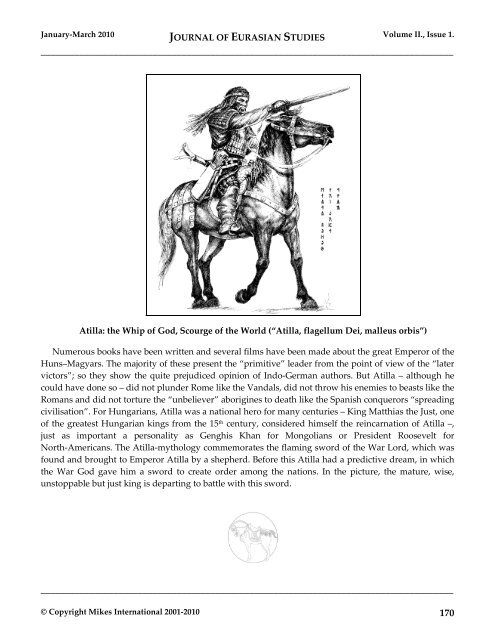EurasianStudies_0110..
EurasianStudies_0110..
EurasianStudies_0110..
Create successful ePaper yourself
Turn your PDF publications into a flip-book with our unique Google optimized e-Paper software.
January-March 2010 JOURNAL OF EURASIAN STUDIES Volume II., Issue 1.<br />
_____________________________________________________________________________________<br />
Atilla: the Whip of God, Scourge of the World (“Atilla, flagellum Dei, malleus orbis”)<br />
Numerous books have been written and several films have been made about the great Emperor of the<br />
Huns–Magyars. The majority of these present the “primitive” leader from the point of view of the “later<br />
victors”; so they show the quite prejudiced opinion of Indo-German authors. But Atilla – although he<br />
could have done so – did not plunder Rome like the Vandals, did not throw his enemies to beasts like the<br />
Romans and did not torture the “unbeliever” aborigines to death like the Spanish conquerors “spreading<br />
civilisation”. For Hungarians, Atilla was a national hero for many centuries – King Matthias the Just, one<br />
of the greatest Hungarian kings from the 15 th century, considered himself the reincarnation of Atilla –,<br />
just as important a personality as Genghis Khan for Mongolians or President Roosevelt for<br />
North-Americans. The Atilla-mythology commemorates the flaming sword of the War Lord, which was<br />
found and brought to Emperor Atilla by a shepherd. Before this Atilla had a predictive dream, in which<br />
the War God gave him a sword to create order among the nations. In the picture, the mature, wise,<br />
unstoppable but just king is departing to battle with this sword.<br />
_____________________________________________________________________________________<br />
© Copyright Mikes International 2001-2010 170

















